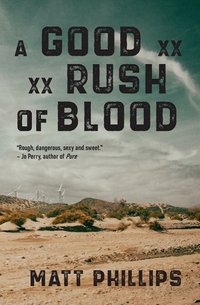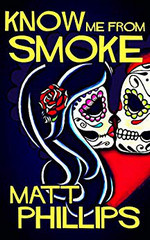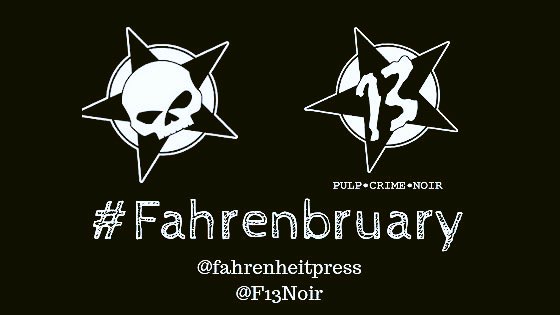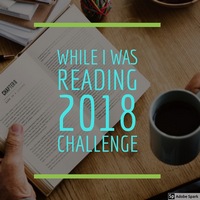 A Good Rush of Blood
A Good Rush of Blood
DETAILS: Publisher: Runamok Books Publication Date: November 1, 2023 Format: ARC Length: 299 pg. Read Date: October 23-26, 2023

What’s A Good Rush of Blood About?
Creely Nash is almost forty, single, a waitress in downtown Portland, and a drug runner. That last item may be eye-catching, and it’s really the only thing in Nash’s life that could be described that way.
She’s been driving for Animal for long enough for him to trust her implicitly—she gets the job done with no muss, no fuss, and no questions. Pick up from some place in the Western US and deliver it somewhere else. Period. She gets a nice flat fee and goes back to work. She’s started a savings account so that one day she can move south of the border and forget everything else.
And then Animal has her do a job in Palm Springs, California. When she was 16, Creely ran away from her mother there and never looked back. She’d never been back, either. She should’ve told Animal no—it might not have been good for their working relationship if she had, but it’d be better than it ended up being.
One thing leads to another, and she runs into a face from her past who tells her that Creely’s mother is doing life in Chino for murder. The wheels come off at that point—there’s no love lost between Creely and Blossom, but you don’t shake off news like that. Creely delays returning to Portland (angering Animal) to stop in Chino. Blossom tells Creely she’s innocent, but not much else.
Creely decides to stay in Palm Springs and get some answers—at least for herself, but maybe for her mother, too. Animal is beyond angry at this point and promises Creely that if she’s not home soon, she’ll be killed.
She’s about as unlikely an amateur detective as you’re going to find—and this is no cozy where gumption and banter are going to get her anywhere. But luck, making a good friend or two, and a knack for being in the wrong place at the wrong time just might put her on the right trail.
So, what did I think about A Good Rush of Blood?
I didn’t think of Know Me from Smoke once while reading this book. But I’ve had a hard time not thinking about it every time I’ve thought about the book since then. Briefly—this is a better novel in just about every way that I can think of. But I didn’t care about what was happening or the people it was happening to nearly as much as I did with Know Me from Smoke. This probably says more about me than either book (I’m not sure what it says, however).
Now that I’ve got that out of the way, hopefully, my subconscious will allow me to focus on this book by itself.
The characters are so well-drawn that it’s hard to think of them as characters. It’s common to talk about a well-depicted as “flawed.” These characters are beyond flawed—some of them seem to be nothing but flaws. This is not a criticism in any way—these characters are real. The kind of people that we pass by every day—some of us even are these people.
Throughout the book, Creely accumulates people to help her in one form or another. And she does very little to obtain these helpers—in fact, she sometimes tries to shake them off. But it’s only through the addition of her allies that she comes closer and closer to getting the answers that she’s looking for. It’s not that she’s been friendless before—or ally-less even. But I didn’t get the impression that she’s had this many at once before.
I don’t understand the motivation for two of her allies—the two who end up personally most important to her. The more I consider the novel—and what these two characters say about themselves and their reasons for helping Creely—the less I understand them. It’s not that I find them unbelievable as characters (see what I said above), nor that I think we have to understand the motivations of everyone in life or fiction. But I really want to sit them down and ask, “Why are you putting yourself through this for this stranger? I know what you said, but really, why?” Maybe it’s because they’re easily the most likable characters in the book that their involvement in this mess (to put it succinctly)—and the ones who will benefit the least from it—that I’ve spent so much time thinking about them.
But those are secondary matters—the focus of this book is Creely. The murder mystery and what she (and others) must accomplish and endure to get answers is secondary, too. This is ultimately a matter of Creely understanding herself and getting a better understanding of the world. That is not to say the reader will necessarily agree with the latter—but it’s important. Creely would, I believe, sneer at the notion of “self-discovery” (I’m not sure that Phillips would be crazy about it either), so I won’t say she’s on a voyage of self-discovery here—although that’s the cliché one would appropriately use for any other protagonist in similar circumstances.
Creely’s life has been characterized by survival—I imagine her aspirations have been low, characterized primarily by “different than now” and “less bad.” Even her vague plans for getting out of drug running (eventually) could be seen as “getting by in better weather.” But this news about her mother and how it impacted Creely give her the opportunity to do something that counts. Something that could have a lasting impact for someone (in a positive way). It’s not about making a mark on the world in a way that draws attention to herself, garners fame, or any of the usual things we see in fiction. Creely finds an opportunity to accomplish something that will affect people. She’s not had that ever—and is unlikely to have it again (especially if Animal finds her.
That’s what drives Creely, what drives the novel—and she discovers, like so many of us, that she really didn’t understand much about her childhood, her parents, and what set her on her path. Sure, there’s more tragedy and drama in her past than some experience—and few have as hazardous a path to learn this as she does. But most readers will be able to relate to what she goes through in some way. By the end of this experience, Creely might be able to do more than simply exist, there might be more for her than getting to the next day. I doubt self-reflection has been a big part of her life prior to these events—and it might not be a huge component after. But she does do some now—and that’s no small thing.
I’ve gone on a lot about character, self-discovery, and whatnot—and you may be saying to yourself that this is a far cry from the “sweaty, fast-paced neo-noir” “[p]eopled with bent cops, grizzled reporters, hardened drug dealers, eccentric sidekicks, and sexy librarians” that the back of the book promises. You’re absolutely right to do that. I can only blather on like that because I’m late with this post—if I’d written this immediately (as intended), I’d have focused on that kind of thing and maybe devoted a paragraph to the things I’ve started to explore above. But I’ve had time to ponder.
“Sweaty” is an incredibly apt word. I kept thinking greasy and grimy for some reason while reading—just a present and real sense of wanting to wipe your hands off on something throughout. It’s like that hole-in-the-wall restaurant where you know why the lights are dim and you don’t care what kind of dodgy things happen in the kitchen because the food is great. “Fast-paced: might be an exaggeration, but it is propulsive—once the “murder” comes into play, there’s a momentum that carries you forward and you can’t get off. Like the moment the roller coaster starts to move and you get the sense that nothing can stop it now.
There’s both a rawness and a cleanness to the prose that makes you know that Phillips sweated over every line—possibly every syllable. It was absolutely worth it—it’s been five years since I first read Phillips, and he’s put them to good use (and the memory of the quality of that writing has remained with me longer than other books I read that year). The power of what he’s given the readers is going to linger in your subconscious.
This is one of the noir-est books I’ve read in 2023—a statement that would hold up in almost any year you read it—solidifying my impression of Runamok Crime as an imprint to stalk. Fans of Jordan Harper, Eli Cranor, or Vern Smith would do well to pick this up.
Disclaimer: I received this ARC from the publisher, but my opinions are my own and honest.
This post contains an affiliate link. If you purchase from it, I will get a small commission at no additional cost to you. As always, the opinions expressed are my own.
![]()







